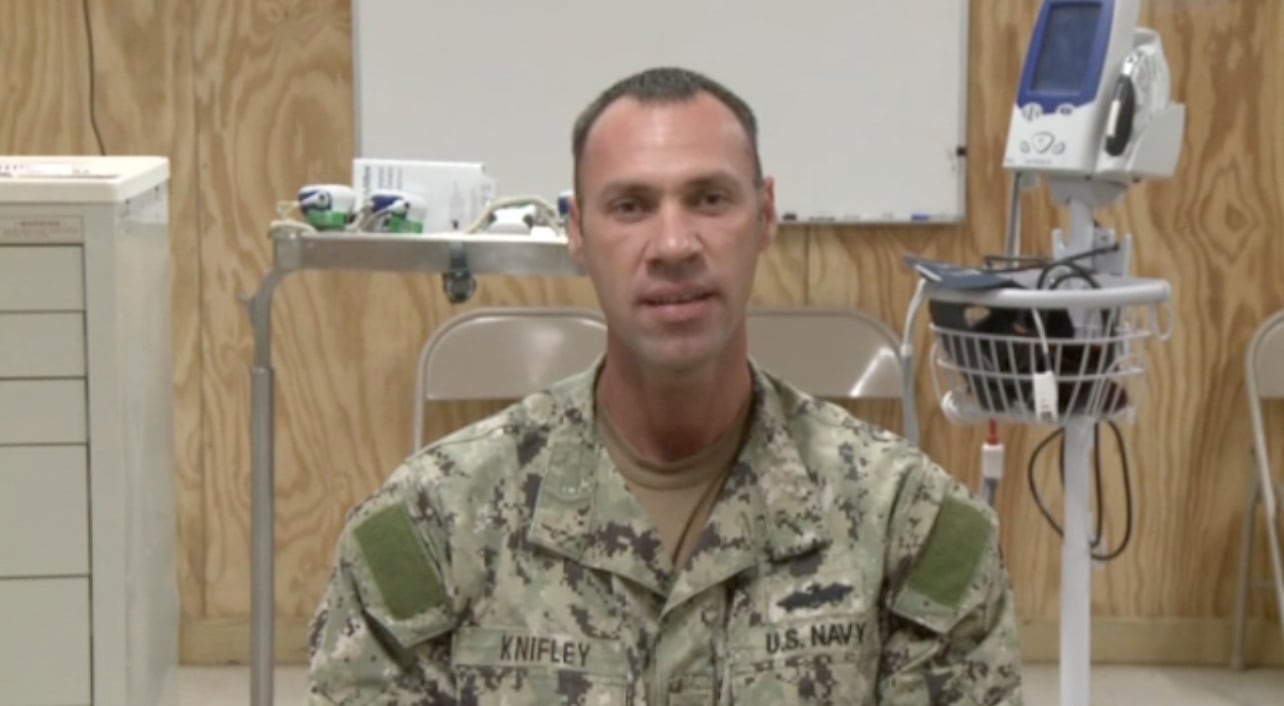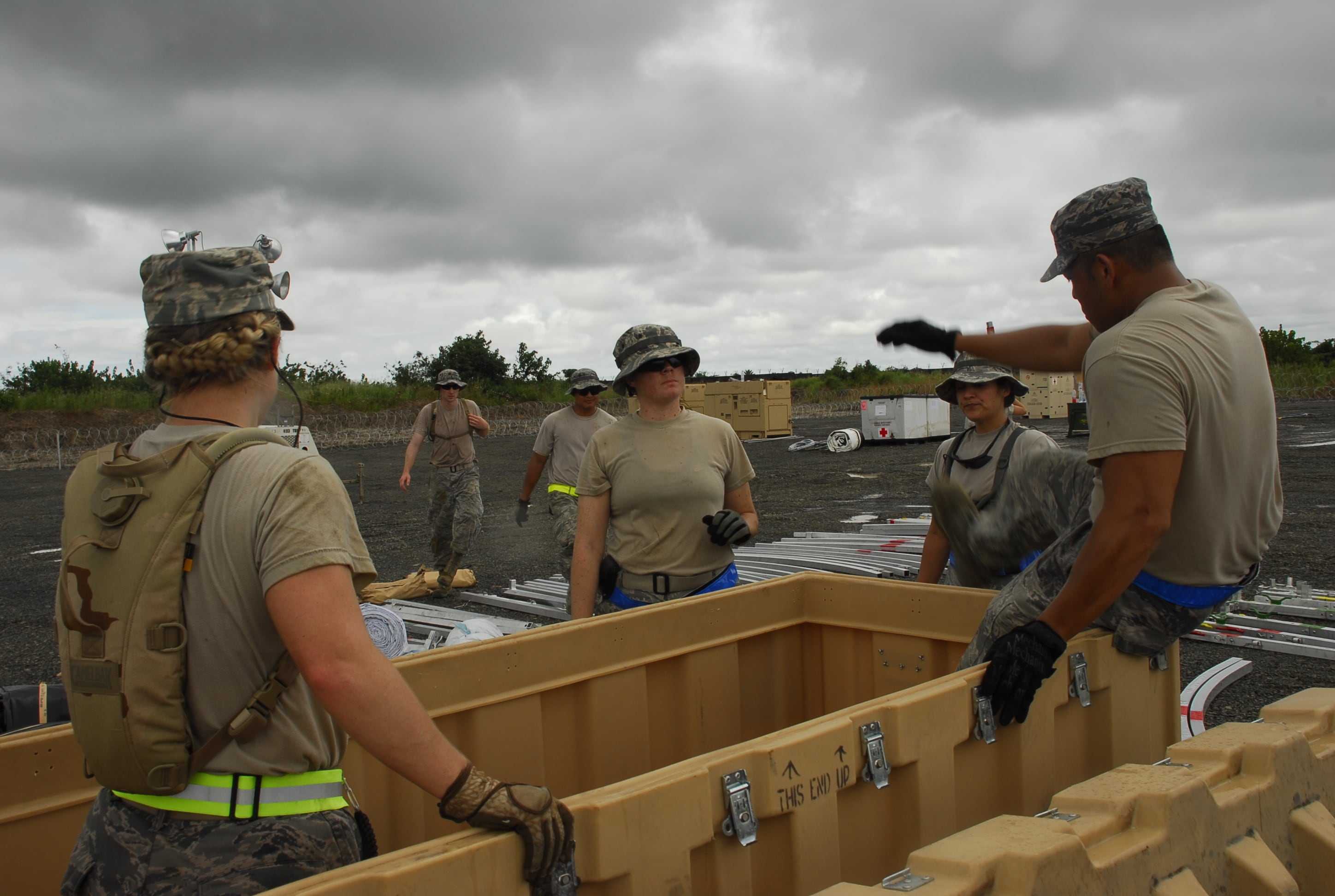A Seabee chief mid-way through a 21-day quarantine after a West Africa deployment said spirits are high for the nearly 90 troops going through the Ebola quarantine — the first of its kind for military troops in the United States.
Their stay in an expeditionary compound at Joint Base Langley-Eustis, Virginia, is "like a vacation," the Seabee reported.
Chief Equipment Operator (SCW) Chief Jason Knifley arrived at the compound from Liberia, Africa, on Nov. 13, along with 51 airmen, 26 sailors, four Marines and two soldiers. Medical screenings are held twice daily, and no one has shown any signs of infection.
Their compound has Wi-Fi throughout, as well as a basketball court, soccer field, gym, and an entertainment center with flat-screen televisions, video games, foosball and billiards. The Air Force's 633rd Air Base Wing even threw in the NFL Sunday Ticket package as well as some pay-per-view fights.
"Langley has done us pretty good over here," Knifley said in a phone interview. "This isn't bad at all."

Chief Equipment Operator (SCW) Chief Jason Knifley says spirits are high among the service members quarantined in Virginia after a deployment to West Africa.
Photo Credit: Senior Airman Jordan Garner/Air Force
Since Knifley and company will not be able to spend Thanksgiving with their families, the mess hall plans to provide a traditional dinner with turkey, ham and all the trimmings. The quarantined troops coordinated their own football game and "Turkey Trot" run (an asphalt road circles the compound's perimeter).
The chief is one of 15 Seabees from Naval Mobile Construction Battalion 133 who teamed with airmen to set up a 25-bed Monrovia Medical Unit, or MMU, modified to meet the needs of Ebola treatment. During their 50 days in country, the Seabees laid the foundation and built support structures such as visiting centers, heads and laundry facilities. They also teamed with engineers from the Liberian Army and provided "horizontal work" for three of 17 Ebola treatment facilities in the works.
"Seabees are known to get in some harsh, uncomfortable conditions and shine," Knifley said. "Those junior kids, for the equipment they were given, the tools they were given, the materials they were given, they did really good work."
Some of the team, to including Knifley, volunteered for the mission. Despite their willingness to help, There was apprehension at first.

Airmen based at Langley Air Force Base, Va., begin construction on the Monrovia Medical Unit site on Oct. 7 in Liberia.
Photo Credit: PFC Craig Philbrick/Army
"It is the unknown that makes people nervous," said Knifley, who has served with the Seabees for nearly 18 years. "We didn't know a lot about the virus. We did our medical briefs and w[ere] told about it. It seemed pretty gloom-and-doom from the brief, so everyone was very cautious getting in. But once we got there and got in the routine, and started understanding our process and what we were going to be doing, we weren't nearly as paranoid."
The facilities received patients before the team left, team popped smoke, but service members didn't come in contact with anyone who had Ebola and had only "minimal" contact with locals who delivered materials and transported the team to the work site, he said.
Still, the quarantine was "the right thing to do to keep everybody safe," Knifley said. "We want to make sure the troops are being looked after, and the last thing we want to do is go home and get family members or someone in the community sick."
These Seabees won't return home when the quarantine ends. Their command was already deployed to nine worldwide locations when this team was sent to Liberia. The chief will return to Rota, Spain, and the other 14 will head back to Djibouti, Africa. The battalion is scheduled to return to Gulfport, Mississippi, in mid-January. If needed, Knifley said he would volunteer for the Ebola mission again.
The United States has deployed more than 2,500 personnel to West Africa, making this the government's largest response to a global health crisis, according to the State Department.




